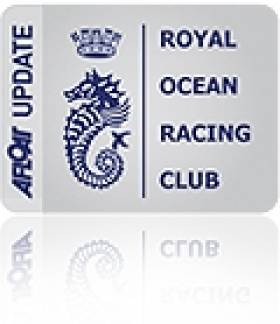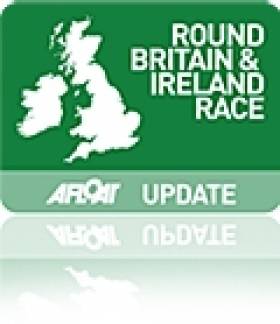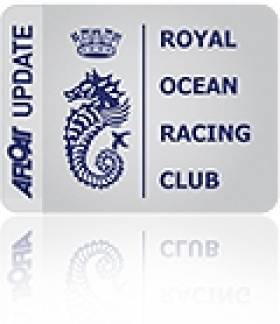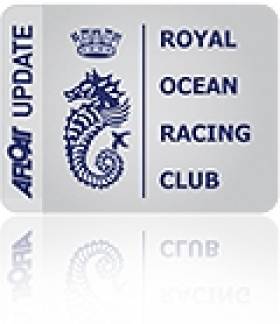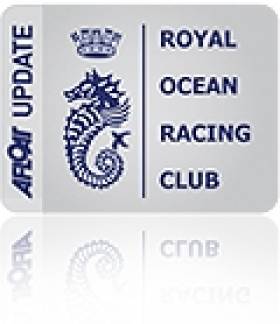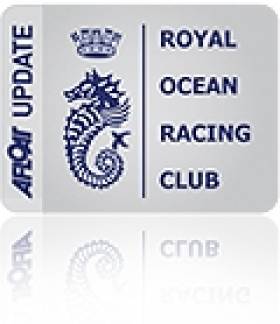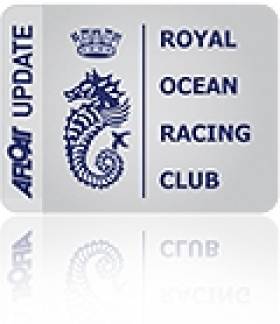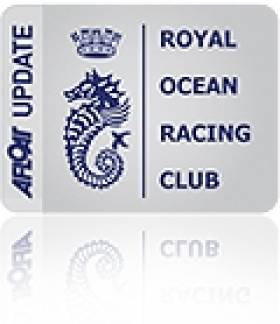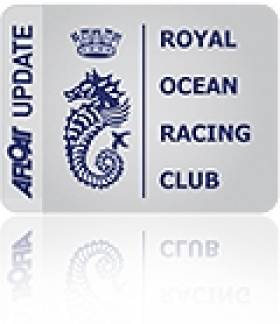Displaying items by tag: Royal Ocean Racing Club
Irish Sailors In Command of International Sailing in London
#rorc – London's unique position at the crossroads of world sailing communications makes it a focus of attention in the winter months. Organisations of international standing will be having key administrative and decision-making meetings in the short non-sailing winter days, decisions which will impact on the coming season and the years beyond.
Sailing's world body, the International Sailing Federation, may take itself off in November to some choice destination resort for a week-long conference, with all expenses paid for the selected delegates. But the more specialist organisations rely to varying extents on voluntary workers with limited time and resources. Thus their constitutionally-required yearly gatherings tend to be compressed into just one day for an Annual General Meeting (AGM), with effective sub committees and executive officers being relied on to see that decisions made on that day are implemented through the coming year.
It has been a typical winter season in London with the AGM of the Royal Ocean Racing Club in December, and then January saw the annual log adjudication announcements of the Royal Cruising Club - it's a cruising achievement assessment process which goes back to 1896, while the club itself is far and away the world's most senior cruising organisation, as it dates back to 1880. The RCC meeting was then followed nine days later by the Annual General Meeting of the Old Gaffers Association, founded 1963 and now maturing very well as an international body.
There was nothing at all unusual in the fact of these three meetings being held. But it was unusual that, in all three gatherings, the leading roles were filled by Irish sailors. W M NIXON takes up the story.
When Michael Boyd became Commodore of the Royal Ocean Racing Club on December 1st 2014, it was at the conclusion of a year in which Ireland had performed exceptionally well in the club's international racing programme, with a clear victory in the Brewin Dolphin Commodore's Cup series, while Anthony O'Leary's Ker 39 Antix from Cork became RORC "Yacht of the Year" after a season which included winning the club's National IRC Championship and being Captain's Boat in the Commodore's Cup squad.
But it was steady years of service on committees and in the secondary flag officer roles, rather than Irish success in the club's racing, which led to Michael Boyd's elevation to the top post, allied to his long personal involvement of participation in all the main RORC events, and many minor ones too.
And it was not the first time an Irish sailor has played a key role in this unique organisation. Back in August 1925 at its founding in Plymouth immediately after the first Fastnet Race, one of the seven skippers involved was Harry Donegan of Cork, whose 50ft cutter Gull had placed third overall in what was to prove a turning point in world sailing history.
Although the newly formed Ocean Racing Club was to more or less kidnap the Fastnet Rock to become one of its symbols, Donegan was the only skipper who had raced round it before. He had taken part in the time-honoured contests from Cork Harbour to West Cork, supporting Schull Regatta which dates back to 1884, while Baltimore regatta can probably claim similar longevity. And Harry Donegan knew West Cork well, having been producing privately distributed sailing directions for cruising enthusiasts to its harbours and anchorages since at least 1912.
But inevitably, with the RORC's initial concentration of keen and resource-rich boat-owners sailing from southeast England and focused on London, it was some time before there was another significant Irish presence in the administration of what was gradually developing as world offshore racing's central organization. However, by the 1960s, Denis Doyle of Cork was becoming much involved as a dedicated participant in the RORC offshore programme and on its committee, and by the 1970s he was a Flag Officer.
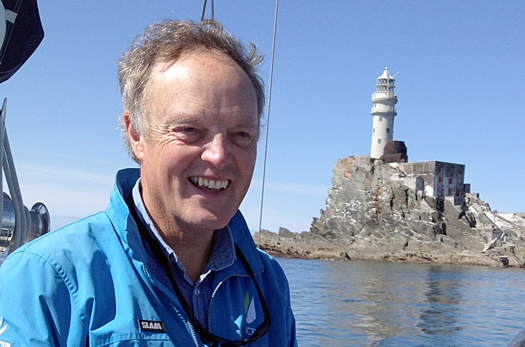
Newly-elected RORC Commodore Michael Boyd at the Fastnet Rock
Yet it was not until 1994 that Ireland provided our first RORC Commodore, John Bourke of Dun Laoghaire. In addition to being a successful offshore skipper in his own right, he had frequently been Denis Doyle's navigator in Moonduster successes, he'd also been a navigator-tactician in Ireland's fourth-placed Admirals Cup tea in 1987's thirteen-team series (our best-ever AC placing, with the Dubois 40 Irish Independent helmed by Tim Goodbody winning the Fastnet overall), and he'd served as President of the Irish Yachting Association.
But John Bourke took over the lead role in the RORC when the times were changing rapidly. Rising costs and the increase in pure professional sailing meant that major international semi-Corinthian events like the Admirals Cup were in rapid decline. And the negative effects of the Fastnet Race disaster of 1979, when 15 lives had been lost, were still being felt in turnouts for RORC events, as much more stringent regulations had led to cost increases and more demanding qualifications for participation. Then too, changing perceptions of the requirements of family life meant that the relatively selfish pattern of offshore racing participants disappearing for frequent long weekends of racing were simply no longer acceptable.
Against that, the RORC had played a key role in co-ordinating and administering the new global International Offshore Rule for handicapping. Then when rapidly evolving boat design and building techniques meant that the IOR was no longer fit for purpose, the RORC was ideally placed to oversee the changeover to the International Rating Certificate (IRC) through experience gained with the administration of the Channel Handicap system, of which elements were kept secret in order to avoid computer-aided exploitation.
So by staying with what it did best, the RORC began to prosper again. As time passed, the sheer horror of the 1979 Fastnet was slowly healed in the memory, so much so that the simple reality is that nowadays, the mythology of '79 adds to the allure of the event. In other words, the entry limit of 340 boats for the Rolex Fastnet Race 2015 was virtually filled within hours of opening. The club really does have a problem of success.
Meanwhile, it has added to the complexity of its shoreside structures by merging with the Royal Corinthian Yacht Club in Cowes. So the RORC is now a club with two clubhouses. There's the historic townhouse HQ in St James's Place in the heart of fashionable London into which it was guided in its early days by ocean racing legend John Illingworth. And there's now a summer place right beside the Royal Yacht Squadron, a rambling building with a colourful history, as members of the Royal Corinthian YC had bought it in the first place from the noted London "hostess" Rosa Lewis, who transferred her boisterous hospitality operations to Cowes during the height of the summer season.
With the new setup possibly being perceived by some members and potential members from other areas and distant nations as too much of a London-Solent nexus, it's interesting to hear that the RORC membership is continuing to increase in a very encouraging way. Clearly, these are exciting times for an organisation of increased global standing, so it's fascinating to note that the two key players in today's RORC administration are keen sailors who took their first serious steps afloat at the same time at two ports just 54 miles apart on each side of the Irish Sea.
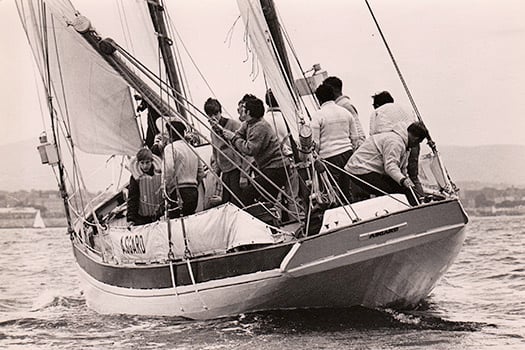
Michael Boyd has his first offshore sailing experience aboard the first Asgard in 1969.
Michael Boyd (64) may work in a demanding London-based international consultancy, and his Irish home may be in the depths of the country in the hidden northern reaches of County Meath, but in sailing terms he's Dun Laoghaire through and through. His father Liam was a stalwart of the Dublin Bay 21 class, and his own first forays offshore were as a youthful trainee aboard the 51ft ketch Asgard under Captain Eric Healy's command during the early days of the historic vessel's six seasons as Ireland's sail training vessel from 1969 to 1974.
At precisely the same time, just across channel in North Wales, his contemporary the young Eddie Warden-Owen was cutting a swathe through dinghy sailing at Treardur Bay and Holyhead. Very quickly, with a GP14 called Gwladys, he was achieving national success, and that in turn led to a career in sail-making and then on to professional sailing at the very top level – his success as coach in making a formerly lacklustre Italian campaign into serious contenders in the America's Cup is now text-book material in advanced sailing courses.
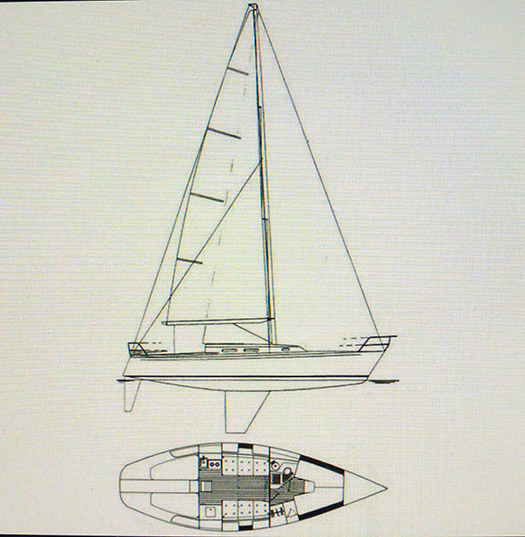
Michael Boyd's choice of a J/35 as his first serious offshore racer was a shrewd decision. He won the Round Ireland Race with the J/35 Big Ears in 1996, and more recently the J/35 has been one of the few exceptional boats to be inducted into American Sailing's Hall of Fame
As for Michael Boyd's sailing career, while it had to be fitted in with hyper-demanding international business commitments, he first really hit the headlines in 1996 with the overall win of the Round Ireland Race with his J/35 Big Ears. He was a regular and successful contender in RORC events, but these days his personal and family boat is through a partnership in the handsome Sparkman & Stephens-designed Maine-built performance cruising ketch Southerly, which is based at New Ross in County Wexford on the tidal section of the River Barrow, while his racing needs were met during 2014 by chartering the Grand Soleil 43 Quokka with fellow RIYC member Niall Dowling.
With Quokka, they were not only a much-valued part of the winning Irish Commodore's Cup team, but were top boat in Cork Week 2014 to win both the Hugh Coveney Cup and the historic 1859-vintage "Kinsale Kettle", a splendidly ornate and substantially-sized bit of Victorian silverware "which we were allowed to sit beside for just about ten minutes – there was no question of taking it home to Lobinstown".
The co-skipper of Quokka (they've chartered her again for 2015) is clearly an enthusiast who relishes our sport, and the ins and outs of sailing in all its ramifications. He makes an ideal person to be Commodore of the RORC at an important juncture in its development, and with Eddie Warden-Owen as the club's CEO, he has a kindred spirit with whom ideas can be developed and implemented at impressive speed.

Eddie Warden-Owen, CEO of the rapidly-developing Royal Ocean Racing Club. He was starting to hone his renowned racing skills at Holyhead just 54 miles across channel from Dun Laoghaire where, at exactly the same time, Michael Boyd was starting his sailing career.
So when your reporter had lunch with the new Commodore just eight days ago, he should have kept the main man strictly on track for a serious discussion of the challenges that club and sport face. And so we did for a while. But when you're with somebody with Michael Boyd's personal enthusiasm for participation sailing, dusty discussions on administrative matters have to run in parallel with wide-ranging and entertaining talk of sailing, boats, sailing folk and the wonders of the sea – the man certainly knows his boats and places and people .
Underneath it all, there was a good impression of the necessary range of his activities – for instance, in the week he became Commodore, he had to be in France for the RORC's Paris Dinner linked to the annual Boat Show there, and he is keenly aware of the club's global spread and the significance of people like Piet Vroon of the Netherlands and the Gouy family of France with their truly international approach to the sport and their regular participation in the Round Ireland Race.
Looking to the west, the club has a strong presence in the Americas, which has been reinforced with the annual RORC Caribbean 600 every February since 2009. This year it will see an uplift in the entries by hundred footers, notably by Syd Fischer's "new hull/original deck and rig" Ragamuffin 100 fresh from the Rolex Sydney Hobart Race, another event in which IRC is the key handicap system.
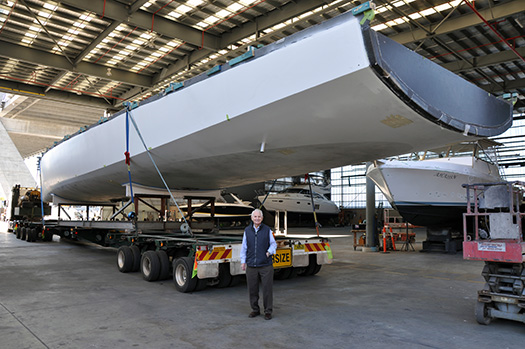
Definitely a sport for life. Syd Fischer, 87-year-old legend of Australian sailing, with the new hull for his hundred footer Ragamuffin just a few months before the recent Rolex Sydney-Hobart Race. Ragamuffin made it in time for the race, she took third on line honours, and now she is being shipped to Antigua to race the RORC Caribbean 600 in February.
But although in Australia the IRC is administered by Hobart race organisers the Cruising Yacht Club of Australia, for the biennial Rolex Fastnet in August and annual Rolex Middle Sea Race from Malta in October, the RORC's Rating Office, based in Lymington under the direction of Mike Urwin, is directly in charge. The Rating Office celebrated 30 years of the IRC Rule in 2014 with a growth in ratings issued after a slight decline during the years of economic recession, and the Lymington unit's unrivalled breadth of experience in the ways of bots and designers and offshore racing give it a special worldwide standing, yet another factor in the RORC's unique position in global sailing.
With their combined experience and proven administrative and international skills, the Boyd/Warden-Owen team are able to provide such formidable leadership for an organization which is central to our sport that they are able to do so in an under-stated way which is ideal for dealing with the highly-individualistic characters who are the leaders in their sport.
So when the London sailing-decision-season started in December with the new setup brought into being in the RORC, clearly things were moving in the right direction. Whether they continued to do so with the next item on the agenda, the Royal Cruising Club awards on January 8th, only time will tell. For this time round, I was the one in the hot seat adjudicating, and you feel the hand of history firmly on your shoulder when you're allocating a trophies which have been won in times past by the likes of Conor O'Brien.
But we'll return to that particular restrospective at the conclusion of this article – meanwhile, how did things go at the Old Gaffers Association AGM last Saturday? Sean Walsh of the Dublin Bay Old Gaffers Association became the first overall president from outside the southeast of England a year ago, so this was the first AGM under his guidance throughout, and it's not a task for the faint-hearted.
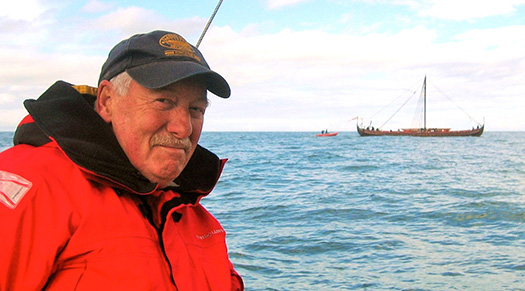
Sean Walsh, President of the OGA, sailing in company with the 100ft Viking ship Sea Stalllion.
As the Old Gaffers Association, with its 5,000-plus members in nine countries, is run almost entirely on a voluntary basis, their AGM is virtually a day long affair, a conference really, which started with an intense General Management Committee meeting (the GMC is made up of the Presidents and Hon Secs of each of the many branches) which is a two hour affair which started at 11am and concluded with a brief lunch break before the fully-fledged AGM took up the entire afternoon and went on well into the evening, a four hours-plus session which was to satisfactorily cover an exceptional range of topics.
The OGA may have had fairly casual get-togethers and an annual race or two as its main activities when it was founded in 1963. But now it has evolved into an active group with an impressively developing website and a widespread season-long programme which still has to take account of the notable individuality of the membership and the astonishing variety of their boats.
They even have a very active trailer section in which characterful yet trailerable gaff-rigged boats can suddenly appear in significant numbers at remote sailing locations – the highest lake in Wales, for instance – and they're developing the concept of "Raids" in attractive cruising areas. In these, the fleet keeps together by a relaxed form of racing in which the boat which has got into the lead is only allowed to stay there for five minutes, then she's obliged to go to the back of the fleet. If using the idea for larger slower-manoeuvring boats, you'd probably make the time at the front of the fleet a bit longer, but nevertheless it's a concept of great potential.
As for activities on the sea, while the main focus of 2014 was the Cruise-in-Company in the Netherlands to celebrate the tenth anniversary of the Dutch branch, in 2015 the focus will be on two cruises-in-company, one to St Malo in northeast Brittany to accommodate the large fleet numbers on the south coast of England and on both sides of the southern North Sea, and the other – aimed at the fleets in southwest England and on both sides of the Irish Sea – assembling at Kinsale on July 17th.
This fleet will go on westward for a week centred around the Glandore Classics, though with forays to the Fastnet Rock and other nearby ports. Glandore will then be followed by a further two weeks cruising towards West Kerry with a circuit of Skellig Michael the target, followed by more leisurely cruising homewards. In all, an epic three week venture which, like the OGA's successful Golden Jubilee Round Britain Cruise-in-Company in 2013, will probably see some boats joining and leaving at different intervals, though for most, staying the complete and very scenic course will be the target.
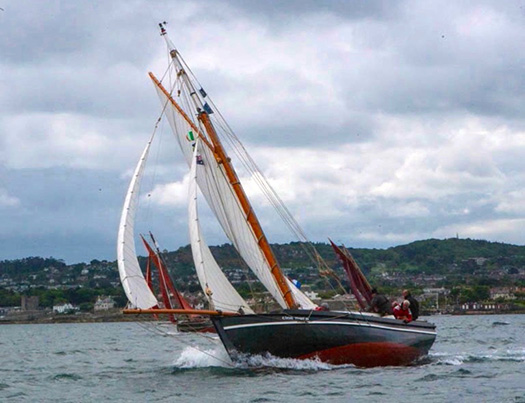
Cine Mara from The Netherlands. Rik Janssen's steel-built version of a traditional Galway Hooker, seen in Dublin Bay during the OGA Golden Jubilee Cruise-in-Company in 2013, was one of the flagships for 2014's Tenth Anniversary Cruise-in-Company for the Dutch Branch of the OGA. She is expected back in Ireland for the 2015 Glandore Classics in July, and the subsequent Old Gaffers Cruise-in-Company to West Cork and Kerry. Photo: Barry O'Loughlin
What with their intense GMC meeting in the morning, closely followed by his four hours and more of moderating the AGM in the afternoon over an exceptional range of topics, Sean Walsh and his team had a busy day of it. But as with any successful body, by the conclusion of the meeting the administrative officers were themselves re-enthused by the energy and commitment of their members. And from the Irish point of view, it certainly means that from July 18th to 24th we're going to have a CH Marine Glandore Classics Regatta 2015 on an unprecedented scale.
By contrast, the Royal Cruising Club works on the notion that small is beautiful. It has only 400 full members, but with a big history going back to 1880 when it was founded in London by a Trinity College Dublin graduate called Arthur Underhill, and its Challenge Cup goes back to 1896, which makes it far and away the world's senior cruising trophy.
In the early days, there were those cruising people who sniffed at the very idea of a "cruising competition". But contests such as this encourage the keeping of proper logs, which is an integral part of seamanship. And in an activity which is remarkably difficult to quantify, qualify and annotate, the story of the many winners gives us an unrivalled narrative of the development of cruising and cruising boats over the past 118 years.
Certainly it's something which the RCC - after some initial and understandable reluctance back in the early days – now takes very seriously indeed, so much so that the identity of the judge is kept an almost complete secret until the announcements go public in early January, and only a couple of others in the communications side of the club know the outcome of his or her adjudications after they've been made in early December – even the Commodore is kept in the dark until the January revelation.
The use of "his or her" in relation to the judge reflects the nature of this extraordinary club, which seems to have always had women members paying an active role. So much so, in fact, that it wasn't until after I'd made the list public that it was pointed out to me that of the awardees, more than half were women sailors. I simply hadn't noticed – I was only trying to highlight the twelve best cruises out of an impressive total of 40 logs submitted.
Most of the awards are of a relatively private or specialist nature within the club, but the Challenge Cup is of public interest – in the early days of the BBC radio, its recipient would be revealed on the airwaves. And another main award, the Cruising Club of America Bowl – went to a boat of Irish interest, the 44ft steel-built gaff yawl Young Larry (Andrew & Maire Wilkes) which is well-known about Dungarvan, as Maire was noted West Waterford solo sailor Maire Breathnach before she teamed up with Andrew.
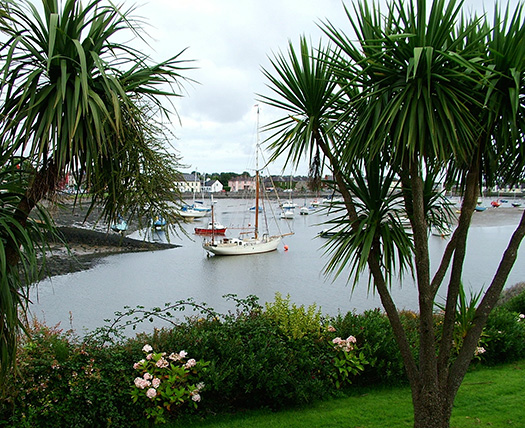
The extensively-cruised steel gaff yawl Young Larry snugly moored in the pool just below the bridge in Dungarvan. Photo: Donal Walsh
This remarkable couple have also been recognised by the Irish Cruising Club, and in the spring they'll be presented with the ICC's Fastnet Trophy which is for exceptional achievements which have included a voyage circumnavigating North America, which of course included the east-west transit of the Northwest Passage. Having done and dusted the Northwest Passage, so to speak, in 2014 they returned to its southeastern approaches to cruise in detail the areas they'd to by-pass before, thus well-qualifying Young Larry for the CCA Bowl.
It's for a "cruise of any duration which includes a valuable contribution to Port and Pilotage information", and as Andrew and Maire's account of their cruise – which was via Ireland, Scotland, the Faeroes, Iceland, Greenland, Baffin island and Labrador before laying up for the winter in Newfoundland – is replete with sailing directions and anchorage information (sometimes obtained while in almost-too-close contact with polar bears), they fitted the Americans' requirements perfectly.
The Challenge Cup for the best cruise of the year has always had strong Irish associations, as in 1896 its first awardee (you don't "win" cruising trophies) was Dr Howard Sinclair of Belfast for a cruise round Ireland in his 23ft cutter Brenda. The pace and scale soon quickened, for in 1923, '24 and '25 it was awarded three years on the trot to Conor O'Brien of Foynes for his unprecedented global circumnavigation south of the great Capes in the Baltimore-built 40ft ketch Saoirse.
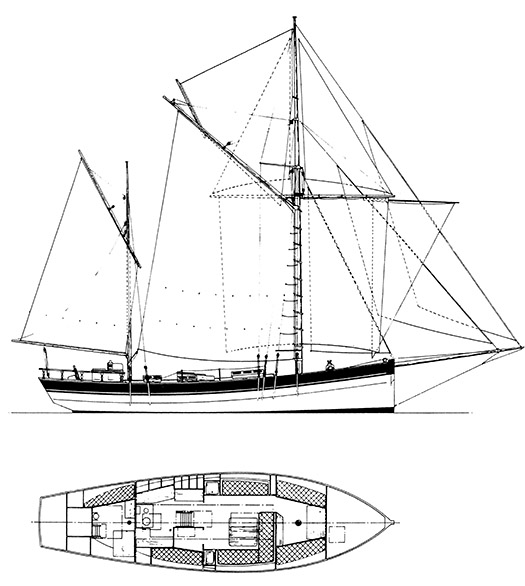
The Baltimore-built Saoirse. Conor O'Brien of Foynes was awarded the RCC Challenge Cup in 1923, 1924, and 1925 during his unprecedented global circumnavigation south of the great Capes in this 40ft ketch
More recently, Peter Guinness – originally of Howth – was awarded it in 1960 for an extensive cruise with the cutter Rob Roy McGregor, and then John Gore-Grimes from the same home port took it in 1985 for an exceptional Arctic cruise in the Nich 31 Shardana, the same skipper being honoured again for a long voyage north of Russia with the Najad 441 Arctic Fern in 2003.
Those who think the icy northern wastes are best left to polar bears will be cheered to learn that for 2014, I awarded the Challenge Cup to a sweet little own-built 34ft junk-rigged schooner which skipped across the oceans in the warmer zones like a flying fish. Then when she reached the end of each ocean voyage, her husband-and-wife crew would cruise each coastline visited as though that was the only cruise they'd be doing all year – in other words, with total enthusiasm and genuine interest in the people they met in some very obscure places.
But then, when you've a Jay Benford-designed Badger class schooner which you built yourself, you can comfortably fit in anywhere without offending the sensibilities of the locals by a gross display of affluence. Charlotte Waters – who is an artist – and her master craftsman/furniture designer husband Dan Johnson built their little boat Hestur with very limited resources near their cottage at Ullapool in Wester Ross in northwest Scotland. In their first season of 2013, they cruised to the Canaries via northwest Spain, then through 2014 they cruised on to West Africa and journeyed far up the Gambia River just before the outbreak of ebola, then went safely on their way to Cape Verde, across the Atlantic to cruise the Caribbean in detail, then on to Bermuda, the Azores, southwest Ireland, North Wales and so home to Ullapool leaving a very minimal carbon footprint in a voyage very worthy of the world's most senior cruising award.
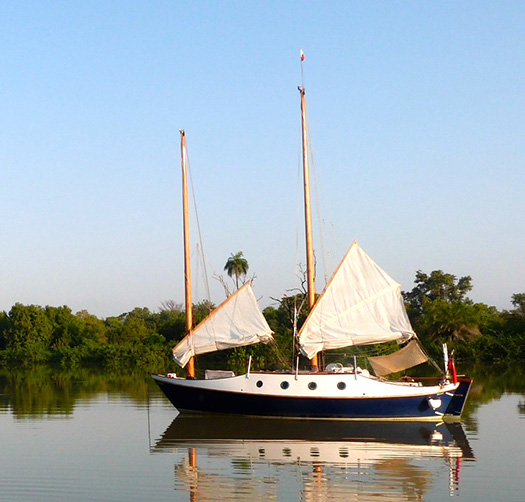
Small and simple is beautiful and just right in a good cruising boat. Seen here far up the Gambia River in West Africa, this is the own-built Badger class schooner Hestur, whose owners Charlotte Watters and Dan Johnson of Ullapool in Scotland cruised extensively around and across the Atlantic. They have been awarded the RCC Challenge Cup for 2014. Photo: Charlotte Watters
#rorc – The RORC Rating Office, the technical and administrative hub for all things Spinlock IRC rating-related in the UK, is re-badging its Limited Validity TCC (LV TCC) as the Single Event Rating (SER) with immediate effect.
The LV TCC scheme was an initiative launched two years ago as a means of introducing new owners to the benefits of racing under IRC without them having to apply for a full certificate. If owners only wanted to race in one or two events in the year they could apply for an LV TCC, with an upgrade to a full IRC certificate offered at a reduced rate.
The change of name is primarily being introduced to provide a more understandable and user-friendly path to build on the success of the past two years. 2014 saw 81 events accepting LV TCCs with 117 certificates being issued, compared with 54 events and 124 LV TCCs being issued in 2013.
A gateway into IRC racing
The newly branded SER is being rolled out to regatta and race organisers across the UK, with encouragement to include it in communications with their members and potential race and regatta entrants.
In spite of the LV TCC option already being widely available at club events and having been taken up by most major events over the past two years, the vast majority of interest has been from those run in the Solent region e.g. Aberdeen Asset Management Cowes Week, the J.P. Morgan Asset Management Round the Island Race and Panerai British Classic Week.
The LV TCC has given owners the opportunity for a memorable day or week of IRC racing at minimal cost. However, it is positive to note that a small number of boats that held LV TCCs in 2013 have upgraded to full IRC certificates in 2014 and as the Rating Office Technical Director, Mike Urwin, comments, "We may not yet be seeing vast numbers but it is satisfying to have made some converts."
He continues, "Noting the apparent strong Solent/major event bias, while the significant increase this year in the number of events accepting LV TCCs confirms that Clubs around the UK are keen to get more people racing, we recognise that many potential racing owners are not aware of the SER option, or the help and advice they can get from their local IRC Advocates or the Rating Office.
"We hope that the change of name will make SER more accessible and widely recognised, and. we will also be talking further to club officials and members at the regional level including seminars to be jointly held with the RYA this winter."
Varuna Declared Overall Winner Of Round Britain and Ireland Race
#RORCSRBI - The Royal Ocean Racing Club has declared Jens Kellinghusen's Ker 51 Varuna (GER) as the overall winner under IRC of the 2014 Sevenstar Round Britain and Ireland Race.
Race sponsors Sevenstar Yacht Transport have also awarded Jens Kellinghusen with a $20,000 voucher to ship Varuna to their selected destination worldwide, which will be used to transport the boat to Malta to take part in the Rolex Middle Sea Race, the final race of the RORC Season's Points Championship.
Although six yachts are still racing, none of them can better Varuna's corrected time racing under IRC.
Varuna has no powered winches and the tough conditions required tremendous physical exertion and long hours hiking out on the rail.
Kellinghusen was quick to praise his crew for their performance. "The weather conditions really suited Varuna," he said. "Our biggest competition was with the canting keel boats, which would have preferred reaching, but the downwind conditions towards the end were ideal for us.
"I am so happy for the crew as they all did a great job and the boat held together in some testing conditions. I am very pleased, this is the first time we have participated and we really enjoyed the race. We already use Sevenstar for transporting Varuna, so the $20,000 from the sponsors is very much appreciated."
Aside from team owner Kellinghusen, Varuna's winning crew comprised pit/boat captain Tim Daase from Wewelsfleth in Germany; runner Guenter Alajmo from Hamburg; navigator Guillermo Altadill from Barcelona; trimmers Luke Molloy from Brisbane, Australia and David Blass from Braunschweig, Germany; pit Fynn Terveer and drivers Jan Hilbert and Gunnar Knierim, all from Kiel in Germany; and bows Peter Knight from Guernsey, Christian Stoffers from Kiel and Alastair Sayers from Hobart, Tasmania.
At 9am BST this morning (Friday 22 August) the remaining six yachts racing in the Sevenstar Round Britain and Ireland Race were experiencing downwind conditions in plenty of breeze.
Relentless on Jellyfish, the J/122 skippered by James George, was just 38 miles from the finish holding off a strong challenge from the Army Sailing Association's J/111 British Soldier, which is six miles behind the on-the-water leader. Both yachts were expected to finish this afternoon.
Saga, the Hanse 531 skippered by Peter Hopps, passed The Lizard at midnight. At as of 9am this morning, Saga was 30 miles from Portland Bill with 100 miles to go. Saga is expected to finish the race around midnight on Saturday 23 August.
Just after midnight last night, Ian Hoddle's Figaro II Rare passed Liam Coyne's First 36.7 Lula Belle, as the two-handed teams approached the Scilly Isles. As of this morning Rare and crew had extended their lead by 11 miles to lead on the water as the two yachts passed The Lizard.
However, after time correction, Lula Belle is still the leading the two-handed class by a considerable margin. Werner Landwehr's Figaro II, Dessert D'Alcyone, was 70 miles from the Scilly Isles, 300 miles from the finish.
Coyne, skipper of Lula Belle, contacted the Royal Ocean Racing Club in the early hours of this morning. The Irish pair of Coyne and Brian Flahive have been racing for 11 days surviving gale-force winds, but fatigue and gear failure is taking its toll.
Lula Belle's engine has failed to start, essential to charge their batteries, and the sails are showing signs of the battering they have received.
Without access to the fleet tracking player on the RORC website, Coyne was unaware that Rare was passing them, going by what he wrote from Lula Belle while at sea, as previously reported on Afloat.ie.
#antix – Irish Commodore Cuppers are in the frame on the Solent as the RORC British IRC National Championship goes into its third and final day with fickle conditions but stronger than those encountered at the Irish IRC Championships being sailed at the same time on Dublin Bay.
Royal Cork's Anthony O'Leary's Ker 39, Antix, is the new leader after the second day of racing.
The Eastern Solent provided a fascinating combat zone as Mike Bartholomew's South African GP42, Tokoloshe, slipped to second place, four points off the lead. Marc Glimcher's American Ker 40, Catapult, had an excellent day on the water, climbing to third place by virtue of two bullets and a second, beaten by Antix by just 17 seconds. There were podium finishes today for Harmen de Graaf's Dutch Ker 40, Baraka GP, and Stewart Whitehead's Farr 45, Rebel.
A fickle northerly breeze at the start provided shifty conditions before clocking east and building to a solid 15 knots of pressure. During the final race a massive rain squall brought a short sharp intensity to the final race with over 20 knots of wind and driving rain, testing the endurance of the teams. The second day of the championship was full of incident and intense boat-on-boat action. The teams that handled their yachts well, in close quarters and rapidly changing conditions, were the outstanding performers of the day.
IRC One
Catapult's Boat Captain, Geoff Ewenson from Annapolis USA, spoke about the tactics for the second race of the day. "The tide was building, across the course from east to west and getting the wrong side of that was not a good option. Even though there was more breeze down tide, we stayed high and that kept us in good shape. The same was true for the tight reach past Lee on Solent. The northerly breeze was being affected by breeze from the east and a significant wind hole was developing. Once again we stayed high to avoid being headed in light air. With clear air we were able to sail faster than the competition and extend our lead."
IRC Two
The new leader, after six highly competitive races, is Jim Macgregor's British Elan 410, Premier Flair, pushing yesterday's leader, Kevin Miller's Scottish First 40, Zephyr into second place, just three points off the lead. Adam Gosling's Corby 36, Yes!, had a highly successful day, winning two of today's races to move up to third. There were podium finishes for Corby 37, Aurora, sailed by Roderick Stuart, Peter Morton's JND 35, Salvo, and Paul McNamara &Tony Lowes's First 40.7, Incognito. Richard Patrick's First 40, Dusty P, won the last race of the day by just two seconds.
Jim Macgregor, owner of Premier Flair, has been joined this weekend by his daughter Kate, who represented Great Britain at the London Olympic Games, and members of the Poole Yacht Club Youth programme. "It is always great to sail with my family and Kate was working the bow yesterday. We have a number of youngsters on the boat, some only 16 years old, which brings the average age down! After a long day yesterday, today was always going to be a test of endurance and it ended with four of us going around the leeward mark together, trying to drop spinnakers in a rain squall packing 26 knots, so it was quite a finale. We are delighted to be in the lead but tomorrow should be an interesting day."
IRC Three
David Franks British JPK 10.10, Strait Dealer, retained the class lead with three podium finishes today including a win in Race Six, but the best performer today was James Chalmers' J/35, Bengal Magic, which won the first race of the day and followed up the victory with two second places. Willem Shopman's Bashford 36, Intention, scored their first win of the championship, taking Race Five by just 11 seconds and promoting the Dutch team to third place. Strait Dealer has a net points score of just nine after six races, the lowest of any yacht racing at the regatta.
Graham Sunderland, a Solent tide expert, is navigator for Strait Dealer. "I have never seen such a mixture of mud and clear water on the east end of the plateau before and it produced highly unusual effects, with that wind direction and tidal flow. Race Officer Stuart Childerley and his team did a sensational job - full marks for the courses today. The Strait Dealer team were also great today; with excellent boat handling skills, it makes strategy so much easier."
IRC Four
Ian Southworth's Quarter Tonner, Whiskers, had an excellent start to the day, nailing the pin end of the line to win Race Four by a big margin. However a collision in Race Five damaged the rig to such an extent that Whiskers can no longer race. Peter Morton's Half Tonner, Swuzzlebubble, retains the class lead. Giovanni Belgrano's Whooper revelled in the heavy conditions in Race Six to score her first win of the championship and are currently just three points off the lead. Whiskers is lying in third place, however a request for redress may alter the situation.
Racing continues this morning for the final day of the RORC IRC National Championship with three more races scheduled before the overall and class champions will be decided.
Results here
RORC De Guingand Bowl Race: Home Win for Cracklin' Rosie
#rorc – Organised by the Royal Ocean Racing Club, the De Guingand Bowl Race was the fifth race of the RORC Season's Points Championship and featured teams from five different European nations: Belgium, France, Germany, Great Britain and the Netherlands writes Louay Habib. Starting and finishing in the Solent, the flexi-course used virtual marks in the English Channel to produce a course that tested the tactical awareness of the fleet, especially in the light airs close to dusk on the south side of the Isle of Wight.
While Piet Vroon's Dutch Lutra 56, Formidable 3, took line honours for the race and IRC Zero it was three British yachts racing in IRC One who dominated the podium for the overall result. Cracklin' Rosie, Steven Anderson's Corby 40, was the winner overall and in IRC One, and the Solent based team was delighted with their second win of the season. RORC Commodore Mike Greville racing his Ker 39, Erivale III, was second overall and Mark Emerson's Rodman 42, Phosphorus, third.
"We want to keep the same team together for the season, which is important in the build up to our main event, the RORC Transatlantic Race," commented Steven Anderson. "The crew put a lot of effort into preparation before the season started, the hull is in the best state it has ever been and Cracklin' Rosie is now dry sailed. We had another great battle with Erivale but to be honest, the lighter conditions we have experienced were in our favour, the competition would prefer more wind which we are bound to get at some stage over the next few months. However, the first three races have been a great boost to our confidence and we were highly motivated going into the De Guingand Bowl Race. This helped our concentration throughout the race, which was a very important factor."
In IRC Two the J/122 Relentless on Jellyfish, raced by James George, was the winner, followed into a well-deserved second place by Robin Elsey and Will Harris who were racing Two-Handed on their Figaro II, Artemis 43. Sailing Logic's First 40, skippered by Nick Martin, Arthur Logic, placed third in class.
Tom Gadsden, navigator for Relentless on Jellyfish, gave an insight into the decisive part of the battle for class honours. "It was very interesting on the south side of the Isle of Wight. We were short tacking around St.Cat's, right up the shore, tacking the boat every five minutes to stay in the shallows and out of the current. It was late afternoon and the sea breeze was fading and the big decision was whether to stay inshore out of the current or go offshore in search of more wind. We left it a little late, fell into a hole and only just managed to escape by the skin of our teeth but several others remained there for several hours."
Ten yachts were racing in the popular Two-Handed Class and all enjoyed an extremely competitive race between themselves and the rest of their respective classes. Five teams finished in the top ten overall and took podium places from fully crewed yachts in the top three of every class they competed in. Taking first place in the Two-Handed Class, as well as winning IRC Four, was the highly experienced multihull and shorthanded sailor from Le Havre, Renaud Courbon, who was racing his First Class 10, Shortgood.
It was a photo finish for second place in the Two-Handed Class, the stakes raised as the two British yachts were also vying for first place in IRC Three. After 24 hours of racing it was Mike Moxley's HOD 35, Malice, who snatched the IRC Three win, and second place in the Two-Handed Class, by just 13 seconds from the J/105, Diablo-J, skippered by Nick Martin. Kevin Armstrong's fully crewed Jazzy Jellyfish won its own battle of the J/109s and came in to claim third in class.
"Not bad for an old boat! But that was very tiring," laughed Mike Moxley after the race. "The course legs were all less than two hours, which meant neither of us got any sleep at all. We did a great job at St.Cat's, where we spotted a breeze line offshore and decided to go for it, whilst Diablo-J seemed to stall inshore. Later in the race, we ran out of wind off Poole and the competition came back with the breeze to cancel out our gain and the last leg was a real fight to the finish. Nick (Diablo-J) was catching us in better breeze and nearly pipped us at the line. Great race, great win - what more can I say."
In IRC Four Noel Racine's JPK 10.10, Foggy Dew, came second to the Two-Handed Renaud Courbon on Shortgood, while fellow Two-Handed entry, David Mossman and Blair Forsyth's J/97, High Jinks, was third.
"It was not a good race for us," admitted Noel Racine. "We had some problems with the engine, which we use to charge the batteries and while I was working on it, I didn't spot a wind hole. We sailed right into it and lost a lot of time because of that - but that is yacht racing. The weather was very nice but there were very light winds and with the mistakes we made I was not very happy! Foggy Dew will be racing again with the RORC for the Cowes-Dinard-St Malo Race, a race that I always look forward to."
Despite Noel Racine's reservations, after the conclusion of the De Guingand Bowl Race Foggy Dew has emerged as the new leader of the RORC Season's Points Championship, followed closely by Louis-Marie Dussere's Raging Bee which is four points behind. With a mere 0.1 difference between them are Steven Anderson's Cracklin' Rosie, in third, and Vincent Willemart and Eric Van Campenhout's MC34 Patton, Azawakh, in fourth. This weekend, the Royal Ocean Racing Club switches focus to the inshore discipline with the IRC National Championship, held in the Solent. The RORC Season's Points Championship will continue with the sixth race of the series; the Morgan Cup Race from Cowes to Dartmouth, starting on the Friday 27th June.
For full results and more information: www.rorc.org
#rorc – The domestic season for the RORC Season's Points Championship kicked off with a test of tactics and endurance for the international fleet of yachts racing from Cowes to Le Havre for the Cervantes Trophy writes Louay Habib. The main tactical conundrum was a windless area in the middle of the Channel. After over 24 hours of racing, a large number of the fleet were compressed in a tight pack, flying spinnakers into the finish line with many yachts finishing within minutes of each other. The Last boat home finished within three hours of the leader.
Gaetan Bourdeaux's team racing French Sunfast 32, Callipyge was one of the last yachts to finish but after time correction was declared the overall winner of the race and lifted the Cervantes Trophy for the first time. Gaetan is from Brittany and bases the yacht in Deauville, Normandy. Callipyge is a family boat, and although Gaetan and his brother have sailed the boat since 2002, it is the first time they have competed it in a major offshore race.
"Are you serious?" responded Gaetan when he heard of the victory. "That is hard to believe but great news! We are a team of four, I sail with my younger brother Gabriel and two friends. This is our first proper offshore race but we race Dragons, which is a good school to learn how to sail. Everbody took the helm and we all slept enough, so we were not too tired and as we are all back to work tomorrow, that is a good thing! I think our tactic to keep up the best boat speed worked well for us. On the water, we were behind everybody and we knew that we would be one of the last to finish but we knew that if we could stay near the other boats we would do well. Also we had the fortune of a favourable current towards the finish, whilst other yachts had current against them. We will definitely be celebrating with a good meal and fine wine tonight!"
Line Honours went to to Rob Lutener's, Ker 40, Cutting Edge withEd Broadway's Hooligan VII just behind as the pair finished the race locked in a duel for the line. Cutting Edge put in a text book light airs gybe to make the finish line first by just 20 seconds. However after time correction, Hooligan VII beat Cutting Edge by just over 4 minutes. Both of these yachts are vying for a place to represent England in the Brewin Dolphin Commodores' Cup. If the opening encounter is anything to go by, these two yachts will have a phenomenal battle during the remainder of the trials.
In IRC One, Steven Anderson's Cracklin' Rosie was the winner, beating a field of very slippery boats including the two Ker 40s, Mills 39, Zero II and King 40, Cobra. Cracklin' Rosie's big race this season will be the RORC Transatlantic Race and the majority of the crew are planning to take part.
"Especially around Bembridge and in the middle of the Channel, we were a good sign post for holes in the wind!" exclaimed Steven. "But it was an interesting race, there were plenty of decisions to be made and we were very pleased that we managed to get the boat going so well and stay in touch with the yachts in our class, as we are rated the slowest yacht in IRC 1. It was very rewarding to get good boat speed, we got passed a lot of the competition using our very small VMG kite, which we only took at the last minute. It kept us going, keeping its shape in the light airs and we sailed the shifts well after Cussy Buoy. We are really pleased, it is a great way to start the season and thank you to the yacht club in Le Havre for a warm welcome and an excellent seafood lunch!"
In IRC Two, Vincent Willemart and Eric Van Campenhout racing Belgian MC34, Azawakh were the winners. Jim Dobie racing Sailing Logic's British First 40, Lancelot was second with Richard Patrick's First 40, Dusty P third.
"This is our first race and to win IRC 2 is great news!" commented Eric Van Campenhout. "Vincent and myself bought the MC34 almost by chance, we were on the ferry after last year's Cherbourg Race and spoke with Sam Marsaudon the builder of the boat and I knew that this was the boat for me. Vincent Willemart and myself have raced against each other for many years and we decided to unify our teams together and start a new campaign on Azawakh. In October, to get ready for a new RORC campaign, we sailed the boat to Belgium and started our winter training.
The Cervantes Trophy Race was very light at the start and the tactic we used to make an advantage was to take a trajectory that was not in a straight line but to the east, curving below the other boats. We knew that our Code Zero is an excellent sail and this line would allow us to use it. Also, with this position on the course, the predicted loss of wind mid-Channel would probably fill in from the east first and we would be closer to the new wind than the other boats. The Code Zero proved to be an excellent weapon and we took the advantage in the middle of the Channel."
Congratulations to other class winners; John Allison's J/109 Jumbuck was the victor in IRC Three, beating fellow British J/109 Diamond Jem, skippered by Robert Stiles by just 7 minutes on corrected time. Louis-Marie Dussere's JPK 10.10 was third in class, racing Two Handed.
In the 15-strong Two Handed Class three French yachts made up the podium, Jean-Louis Stalain's First 31.7, Max was the victorious, Philippe Auber's JPK 9.60 was second, whilst Pierre Viard & Nicolas Siloret's Prism 28, Adrenaline was third.
"The Société des Régates du Havre have been tremendous hosts." commented RORC Racing Manager, Nick Elliott. "The club was willing to keep the bar open all last night and was open at 5 a.m. for breakfast, even though we didn't get any finishers until midday. Their enthusiasm was terrific. Yachts were finishing so close together, you could see them from the balcony, a mass of spinnakers on the horizon descending on the Committee Boat. Well done to everyone who completed a light, challenging and tactical race. It was fantastic to see the persistence of the fleet with very few retirements and lots of boat on boat action. The RORC have received very positive feedback, the Cervantes Trophy Race has been a great start to the domestic season and the warm and sunny weather has definitely helped."
A prize giving for the Cervantes Trophy Race will be held at the London Clubhouse of the Royal Ocean racing Club on Thursday 5th June, all competitors will be welcome. The next race in the RORC Season's Points Championship will be the points weighted Myth of Malham Race, starting on Saturday 24th May from Cowes around the Eddystone Lighthouse.
For more details and full results from the Cervantes Trophy Race go to: www.rorc.org
O'Leary's Antix Holds Slender Lead on the Solent
#rorc – Ireland's Commodore's Cup team captain Anthony O'Leary and his experienced team on Royal Cork's Ker 39, Antix, is leading IRC One at RORC's Easter Challenge off Cowes, but is just 1.5 points clear of Christopher Opielok's Corby 38, Rockall IV, on which Ben Ainslie's former coach David Howlett is sailing. The lead three boats in IRC One each won races today with James Gair's Cowes Race School team on their Mills 39, Zero II, claiming the third in heroic fashion.
As Gair proudly described it: "We port tacked the whole fleet despite being the lowest handicapped boat... The boys were going 'are you serious?' And I said 'we are going for it!' So we crossed the fleet, led them into the beach where there was less tide and more pressure. We ended up going around the windward mark on Tokoloshe's stern and winning the race."
Otherwise Gair described today's conditions as being like snakes and ladders, and it being vital to get the best start. His crew has made use of the free coaching laid on by the RORC at this regatta. "They have been looking at our headsail trim and getting our crew weight in the right place for our fore and aft trim, which is hard to do without having someone in a RIB. Jim [Saltonstall] came past and said we were looking 'like a good bunch of ferrets...'"
From the Netherlands, the de Graaf family on Baraka GP are using the regatta as a chance to get back in the groove after a six month break from racing their Ker 40.
"Our boat handling went well today, but our tactics were a bit off," admitted Mees de Graaf, nodding towards his eldest brother with a grin. "And our speed when it got light was a bit slow," he added, referring to today's last race.
The Baraka team hasn't been making use of Jim Saltonstall's coaching as, for this, they have their own secret weapon..."our mother!" Mees explains. "She is in the RIB and takes all the photos of us and gives us a 'nice' opinion about why we are behind. She is the boss and we have to win..."
In IRC Two, the results are tight with Guernsey's Simon Henning and his crew on the Mumm 36, Alice, one point ahead of James Neville's smart-looking Corby 36 Ino in second, after the latter scored two bullets in today's first races.
Three boats are currently tied on 11 points at the top of IRC Three with David Franks' former IRC Nationals winning JPK 10.10, Strait Dealer, tied with Mark Devereux's Ker 32, Raygun, and Dunkerque Plaisance-Gill Racing Team, the French A-35 of Benoit D'Halluin.
The Raygun crew have previously sailed Devereux' Swan 42 Brevity, and swapped across to their new boat after they acquired her over the winter. "We thought we'd get something to have a bit more fun in," explains helmsman James Anderson. "There are a few good boats at the top of our fleet and without a discard it is about getting good consistent finishes. We want to be on the podium at the end of tomorrow so that we can win a few Easter eggs!"
The runaway train of this year's RORC Easter Challenge remains Louise Morton's all-female crew on her highly successful Quarter Tonner, Espada. Their 3-1-1 scoreline today leaves them 12 points clear of the nearest competition, another Quarter Tonner, Sam Laidlaw's Aguila.
The Southworth family's Quarter Tonner,Whiskers, is currently in lowly eighth, thanks to scoring an OCS in today's second race. They are at the RORC Easter Challenge with an all-star cast on board, but this is the first regatta of their season and they have made substantial changes to their boat over the winter, including a new rig.
"It's been pretty challenging on the brain with very very shifty conditions," admitted helmswoman Liz Rushell. "But it's a training regatta which has been perfect for us as we've been trying a few things out across the range of conditions."
Tomorrow is the last day of the RORC Easter Challenge and brisker conditions are forecast with 20+ knot gusts expected. "It will be a big day tomorrow, but we'll get as much racing in as we can," says PRO Childerley.
Boyd's Quokka 8 Success at RORC's Caribbean 600 Trophy
#rorc – In another indication of the potency of this Summer's Irish Commodore's Cup team, the latest signing Quokka 8 skippered by Michael Boyd of the Royal Irish Yacht Club, has finished second overall in IRC2 at last week's RORC Caribbean 600 Trophy. Results here.
Last month, Irish team mates on the American Ker 40, Catapult, skippered by Peter O'Leary, achieved third overall in Key West regatta in Florida, leading Irish Commodore's Cup officials to conclude that Ireland has a winning combination for the Solent this Summer.
In a month of building excitement for ICRA and its Cup plans, it was finally announced an American and a British yacht would join Royal Cork's Antix to form the 'Green Team' for Ireland.
Although Afloat.ie accurately predicted the team line up some week's beforehand, refering to the team as 'Irish sailing's worst kept secret', such predictions were dismissed by ICRA Commodore Nobby Reilly as 'rumour'. Reilly took to Afloat.ie's popular comment section: 'Worst kept secret? The contracts have only just been signed so Afloat's original report was just a rumour. Fact is ICRA had 4 very competitive boats to choose from', he wrote.
The three boat team is Catapult, a Ker 40 owned by Mark Glimcher of the United States; Anthony O'Leary's Ker 39, Antix from Royal Cork; and the RORC Yacht Quokka, a Grand Soleil 43, being chartered by Royal Irish sailors Michael Boyd and Niall Dowling.
Although there will be a strong Irish crew involvement on all three boats comprising of sailors who first won the Cup for Ireland in 2010. Crew list announcements are awaited.
Meanwhile in Antiqua, Wwith all 60 yachts accounted for, the Royal Ocean Racing Club announced that the winner of the RORC Caribbean 600 Trophy for the best yacht, overall in IRC on corrected time, was George Sakellaris' RP72, Shockwave. The trophy was presented to the Shockwave crew at a Prize Giving held at the Antigua Yacht Club.
"I have a great crew and it was an excellent race, lots of wind and the racing was very close," commented Shockwave's owner/driver George Sakellaris, shortly after finishing the race. "I have done many offshore races but this is the first time I have raced this one and it was against tough opposition. I think the winds were favourable to us and the Shockwave team used that to our advantage. At the end of the day, winning yacht races is all about the team performance more than anything else."
"That is what ocean racing should be all about," commented Shockwave tactician, Robbie Doyle. "Beautiful racing between three very tough competitors, all fighting it out the whole way. A heavy-weight battle without a doubt - no question. I have had great moments in sail boats, but that was as much fun as I can remember. For 600 miles we were always in touch with each other, either up a few minutes or down a few minutes, and it all came down to the last beat to finish. It was like an epic tennis match. Every sail change was race critical. Bella Mente is a magic bullet when power reaching; we knew that before the start, so we set about minimising the time lost."
Robbie Doyle continued, "Bella Mente did a nice job getting through the lee of Guadeloupe by going inshore and at that time she had her time on us. All we tried to do was to stay in touch with her because we knew the race wasn't over. The critical point in the race happened just after Barbuda when Bella Mente got under a cloud and literally stopped and we sailed right up to them. After that we knew that if we just stayed in touch, the win would go to Shockwave - that's yacht racing for you, but what a fantastic experience."
"With all of the yachts now accounted for, the racing team can join the competitors at tonight's Prize Giving for a memorable occasion," commented RORC Racing Manager, Nick Elliott. "There have been some retirements, but we are delighted that there has been only minor damage to yachts. Apart from the expected knocks and bruises for a 600 mile race, everyone is safely ashore and looking forward to a great party."
RORC 600 Underway in Champagne Sailing Conditions
#rorcrc600 – High above the Pillars of Hercules, the magnificent international fleet of yachts enjoyed a sparkling start of warm trade winds, Caribbean swell and brilliant sunshine. Ahead of the yachts lies a breath-taking course around 11 islands with more twists and turns than the Monte Carlo race track.
Two hours into the race and the entire fleet have passed Green Island and are now cracking sheets for the sleigh ride to Barbuda with Hap Fauth's JV72, Bella Mente leading the charge, pulling the trigger, spearing through Atlantic waves at 18 knots towards the only mark of the course.
CSA, Multihull and Class40
Nine boats were in the first start of the race and virtually the entire fleet chose to start at the outer distance mark. Gonzalo Botin's Spanish Class40, Tales II, with highly experienced navigator Nacho Postigo on board, got away to a cracking start followed by Derek Hatfield's Canadian Volvo 60, Spirit of Adventure.
IRC Two & Three
With 18 yachts, this was the biggest start of the race; Bernie Evan Wong's Trustmarque Quokka 8 and Lt Col Paul Macro's Royal Armoured Corps Yacht Club, on Southern Child, had a very close battle for the line, which resulted in Quokka being over and having to return to the line. Lancelot II, EH01 and Ballytrim were in the front row of the starting grid.
IRC One
Despite sharing breakfast this morning, Piet Vroon's Ker 46, Tonnerre de Breskens III, and Colin Buffin's Swan 62, Uxorious IV, were both in an aggressive mood before the starting gun, engaging in a game of cat and mouse at the pre-start. However David Southwell's Morris 486, Kismet, had a perfect timed run and led the class at the start.
IRC Zero & IRC Canting Keel
Even before the start the expected battle of the Mini Maxis was on with Shockwave hunting Bella Mente. Shockwave, Bella Mente and George David's RP90, Rambler, were all in a perfect line hitting the start line at max speed with the Botin ITC 65, Caro; also a fast starter to leeward of this group. Johnny Vincent's TP52, Pace, was also a front runner looking to get inshore and stay out of the way and out of trouble.
Superyacht
The last start of the day produced the hair-raising sight of two enormous schooners match racing each other in the last few minutes to the start, bearing down towards the Pillars of Hercules at full speed, only a boat length apart. The 182ft Adela called for water from 203ft Athos, which duly obliged, putting in a smart tack, and all 300 tons of her went through the wind. The spritely 200 ton Adela smoked through the line with height and pace to effectively win the start -magnificent!
RORC CEO, Eddie Warden Owen was on the start line watching avidly: "This was amazing to watch, just incredible. The way they all have been pushing for the line. Especially Athos and Adela; with only a minute to go to the start, they were only a boat length apart. It is so impressive to see these two beautiful boats in these conditions: 18-20 knots of wind, big seas, crashing through the waves - it's spectacular.
The Class Zero start was unbelievable as well - they were really close, going all the way into the cliffs, calling water on each other. We could hear the screaming from the above the cliffs so there was a lot of adrenalin going on, a lot of aggression too. With the quality of this fleet it is exactly what we expected at the start; a top fleet and they're off, in some fabulous conditions. We wish them good sailing, and good luck."
Eddie Warden Owen continued, "This race has grown in stature and it is not just the boats but the number of professional sailors that are here. This gives you an idea of how important it is to win this race. However we've now got more local boats, more boats crossing the Atlantic from Europe and yachts coming down from America. 60 yachts starting the RORC Caribbean 600 - that's pretty impressive for a race that's only six years old."
RORC Offshore Fleet Set Sail for St Malo
#rorc – This weekend over 170 yachts from six different nations will race across the English Channel to the famous walled port city of St Malo in Brittany, France. The 170-mile race pre-dates the Royal Ocean Racing Club by almost 20 years, with the overall winner taking the impressive gold plated King Edward VII Cup, presented by the British Monarch to the Club Nautique de la Rance at Dinard in 1906.The Cowes Dinard St Malo Race is the ninth race of the 13 race series for the RORC Season's Points Championship and bar next month's Rolex Fastnet Race, is likely to have the largest entry of the RORC season.
Four multihulls will be racing to St Malo including two French Multi 50s: Etienne Hochede's Pir² Port De Fécamp is a vintage trimaran built in 1983 but the hot favourite to take line honours in St Malo will be Loic Fequet's Maitre Jacques, which has finished in the top three in class for both the Route du Rhum and Transat Jacques Vabre. The Multihull record has stood since 2002, an extraordinary time of 5 hours 23 min 33 seconds was set by Maxi Catamaran Maiden 2 and Maitre Jacques is unlikely to beat that.
Mike Slade's ICAP Leopard returns to RORC racing for the first time since taking line honours in February's RORC Caribbean 600. ICAP Leopard set the monohull record for the Cowes Dinard St Malo Race in 2008, averaging 11.61 knots, and the 100ft canting keel maxi is very capable of improving on that. ICAP Leopard's current form in both the RORC Caribbean 600 and last month's record run in the JP Morgan Round the Island Race has them averaging over 13 knots.
"ICAP Leopard was built to set records and take line honours, but to do that we need the yacht in good condition, a top class crew and the right weather. Leopard is in great shape and the crew for the race is very capable, so we just need the third part of the recipe. At the moment, our weather routing is showing a slow start but we could see much more favourable conditions as the race develops, so record pace is a possibility." Mike Slade, ICAP Leopard.
There are 20 yachts racing to St Malo in IRC One including Piet Vroon's Ker 46, Tonnerre de Breskens 3, and Edward Broadway's Ker 40, Hooligan VII, which are currently placed first and second overall for the 2013 season.
With 49 yachts entered, IRC Two is the largest class racing and Géry Trentesaux's MC34 Patton, Courrier Vintage, has been in superb form this season. Courrier Vintage was runner up last year by just seven minutes on corrected time and will undoubtedly feature in the race. Nine First 40.7s and seven First 40s will also feature in IRC Two enjoying a close battle within the class.
Chris Jackson, boat captain for First 40, Lancelot II Logic, spoke about their season. "Stacy Vickers and a number of his friends have chartered the yacht for a Fastnet campaign. Over half the crew have done the Fastnet before and we have high ambitions for the race. It is great to see seven First 40s racing to St Malo, I have never seen that many racing offshore before and the racing is incredibly close; we managed to get the better of La Réponse in the last offshore race by just nine seconds and it is really exciting to have so many boats around you. That pressure really raises the game. The St Malo race will be our last RORC race before the Fastnet and we are determined to get a good result."
In 2012 French yachts dominated the race winning four IRC Classes with Olivier Pesci and his crew on Grand Soleil 40, Beelzebuth 3, overjoyed to win the King Edward VII Cup for the best corrected time overall.
"It was a difficult race to win and we were all very tired but there were important decisions that needed to be made and we got our tactics right at key moments," commented Olivier Pesci "For a crew who come from Brittany, it was a fantastic experience to win the race. Although the firework display at St.Malo was to celebrate our national day, we enjoyed it even more because we were celebrating our victory in the St.Malo Race! For a Breton to win the King Edward VII Cup is a dream come true."
The race to St. Malo from Cowes is one of the oldest yacht races in the world and has always been a popular event with competitors racing with the Royal Ocean Racing Club. The timing of the race coincides with the celebration of the storming of the Bastille in 1789, a symbol of the uprising of the modern French nation. Bastille Day is one of the biggest celebrations throughout France and the fortress village of St Malo will be a hive of festivities and cultural celebrations culminating in an impressive firework display.




























